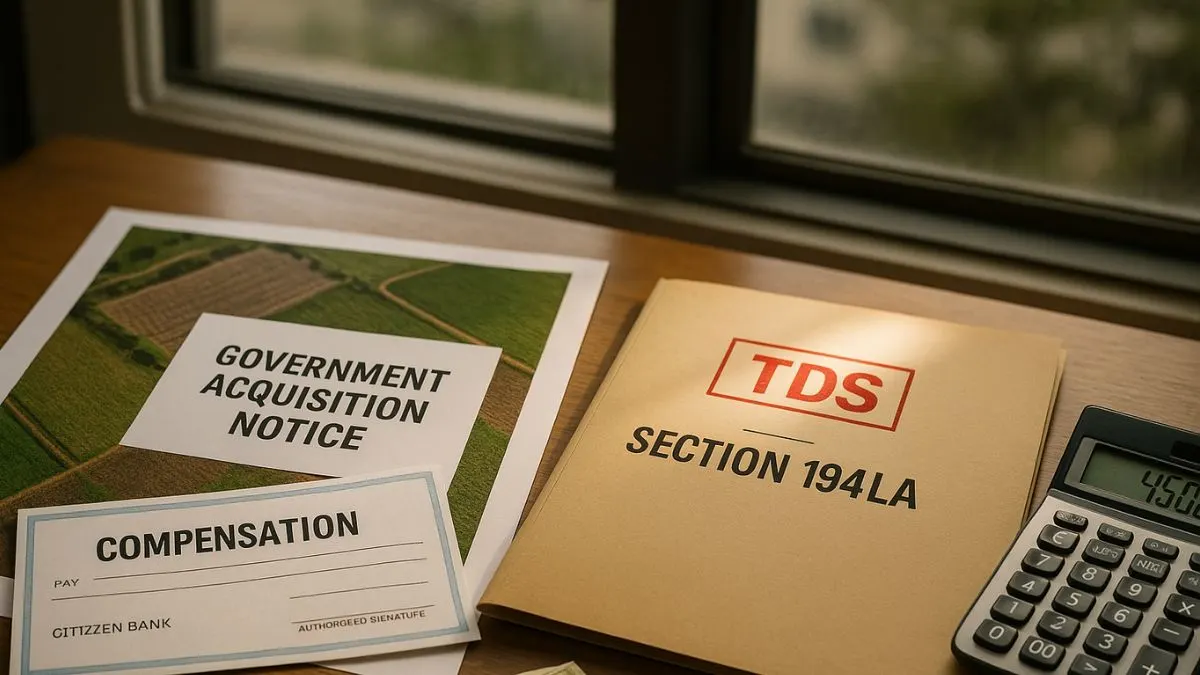
When the government or any authority acquires land or property for public projects like highways, metro, or infrastructure development, compensation is paid to the property owner. But this compensation is not entirely tax-free. The Income Tax Act, 1961, under Section 194LA, clearly lays down the rules for deducting tax on compensation on the acquisition of certain immovable property.
This section ensures that whenever compensation is paid for any land (other than agricultural land) or any building or part of a building, tax must be deducted at source (TDS) before payment. Let’s break down what Section 194LA means, its applicability, exemptions, and how it affects both individuals & businesses.
What is Section 194LA of Income Tax Act?
Section 194LA contains provisions relating to TDS on compensation paid in respect of compulsory acquisition of immovable property.
This means if you receive compensation from the government (or any notified authority) because your property was compulsorily acquired, then the authority must deduct TDS at the rate of 10 per cent before paying you."
This section applies to:
- Any land (other than agricultural land)
- Any building or part of a building
- Compensation received for acquisition under the Land Acquisition Act or any other similar law
Key Features of Section 194LA
- Who deducts the tax?
The person or authority responsible for paying the compensation deducts TDS. This could be the government, a public sector undertaking, or any acquiring body. - Rate of deduction
The tax must be deducted at the rate of 10 per cent. - Minimum threshold
No TDS shall be deducted if the compensation amount does not exceed ₹2,50,000 during a financial year. - Nature of property
TDS under Section 194LA is applicable on immovable property, which includes land (except agricultural land), buildings, and part of a building. - Exemption for agricultural land
If the land acquired is classified as agricultural land, no TDS is applicable under this section.
Also Read: TDS on Purchase of Immovable Property
Example to Understand Section 194LA
Let’s say Mr. A owns a piece of land in the city. The government acquires it for constructing a highway and pays him ₹15,00,000 as compensation.
- Since the property is not agricultural land, TDS provisions apply.
- The acquiring authority will deduct 10% of ₹15,00,000 = ₹1,50,000 as TDS.
- Mr. A will receive ₹13,50,000 in hand, and the deducted TDS will be reflected in his Form 26AS/AIS as credit against his tax liability.
Applicability of Section 194LA
Section 194LA applies in the following cases:
- Compensation paid for compulsory acquisition of land or buildings.
- Payments made by government bodies, municipal corporations, or public sector undertakings.
- Any person receiving compensation above ₹2,50,000.
It does not apply in the following cases:
- When the property acquired is agricultural land.
- When the total compensation is below the threshold limit of ₹2,50,000.
TDS Provisions under Section 194LA
The TDS provisions under this section are straightforward:
- TDS Rate: 10%
- Threshold Limit: ₹2,50,000
- Mode of Deduction: Deduction is made at the time of payment of compensation.
- Filing of ITR: The recipient must report the compensation amount & claim credit for the deducted TDS.
Also Read: Capital Gain Exemption on Compulsory Acquisition of Urban Agricultural Land
Compliance Requirements for Deductor
The acquiring authority or person responsible for payment must:
- Deduct tax before releasing compensation.
- Deposit the deducted TDS with the government within prescribed timelines.
- File TDS returns under Form 26Q.
- Provide the TDS certificate (Form 16A) to the recipient.
Failure to deduct or deposit TDS can lead to penalties and interest under the Income Tax Act.
Judicial Interpretations on Section 194LA
Courts have repeatedly emphasized that TDS provisions under Section 194LA are mandatory unless the property is agricultural land. In several rulings, the ITAT clarified that the nature of the land (whether agricultural or not) determines whether TDS applies.
If the land is agricultural but classified differently in revenue records, disputes may arise, and courts often side with the taxpayer if genuine agricultural use is proven.
Challenges Faced by Taxpayers
- Classification of land: Disputes often arise on whether land qualifies as agricultural or non-agricultural.
- Mismatch in records: TDS deducted but not reflected properly in Form 26AS.
- Delayed refunds: If actual tax liability is lower than TDS deducted, refunds may take time.
- Awareness issues: Many property owners are unaware that compensation is taxable under this section.
How to Claim TDS Deducted under Section 194LA
- Check TDS credit in Form 26AS/AIS.
- File your Income Tax Return (ITR) declaring the compensation amount."
- Claim the TDS credit to adjust against your final tax liability.
- If excess TDS is deducted, you can claim a refund.
Also Read: Capital Gains, Inherited Property & Cost of Acquisition Explained
Why Section 194LA Matters
- Ensures transparency in taxation of large compensations.
- Brings fairness by preventing tax evasion in land acquisition deals.
- Provides clarity for both government authorities & taxpayers.
- Safeguards government revenue while allowing taxpayers to claim TDS credit.
Conclusion
Section 194LA of Income Tax Act is a crucial provision that governs TDS on compensation paid for compulsory acquisition of immovable property. It ensures that whenever land (other than agricultural land), any building, or part of a building is acquired, the tax must be deducted at the rate of 10 per cent before compensation is paid. While this provision safeguards government revenue, taxpayers must also ensure they claim credit for the deducted TDS while filing ITR.
Understanding Section 194LA helps property owners avoid surprises, plan taxes better, & claim timely refunds when eligible.
Got compensation from property acquisition and not sure how to handle the TDS? Our experts at Callmyca.com can help you file your return correctly, claim refunds, and stay compliant. Don’t let your money get stuck — consult us today!











